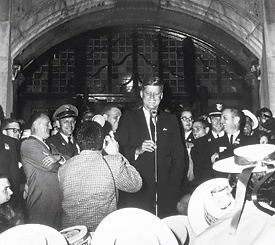Fifty years ago next week, Presidential candidate John F. Kennedy delivered a middle-of-the night challenge that lit a spark among U-M students by challenging them to commit to international service.
Next week, several of those students and many who would follow their lead will return to Ann Arbor to celebrate the 50th anniversary of that occasion and the subsequent events that led to the formation of the Peace Corps.

John F. Kennedy, on the steps of the Michigan Union, delivers a speech challenging students to dedicate themselves to international service. This Oct. 14, 1960, talk set the foundation for what became the Peace Corps. Photo courtesy Bentley Historical Library.
Kennedy only planned to grab a few hours of sleep when he stopped at U-M.
During the evening of October 13, 1960, Kennedy had fought Vice President Richard Nixon, the Republican nominee for president, in the third of four nationally televised debates, flown to Michigan and delivered campaign speeches at the Willow Run Airport and Eastern Michigan University.
He planned to rest at the Michigan Union before embarking on a whistle-stop tour across the state.
But as word of his visit spread, a crowd grew. The dean of women extended the curfew for female students.
When he arrived, just before 2 a.m., he found the steps and sidewalks flooded by 5,000 students.
He could have delivered the speech he’d given already that night. He could have waved and gone to bed.
Instead, in just over three minutes, he delivered a challenge that would inspire U-M students to make a difference in their own lives, their nation and the world.
“How many of you who are going to be doctors, are willing to spend your days in Ghana? Technicians or engineers, how many of you are willing to work in the Foreign Service and spend your lives traveling around the world?” he asked the crowd. “On your willingness to do that, not merely to serve one year or two years in the service, but on your willingness to contribute part of your life to this country, I think will depend the answer whether a free society can compete. I think it can. And I think Americans are willing to contribute. But the effort must be far greater than we have ever made in the past.”
Kennedy never uttered the words Peace Corps.
He simply asked them to lead and to serve.
“I am delighted to come to Michigan, to this university,” he said, “because unless we have those resources in this school, unless you comprehend the nature of what is being asked of you, this country can’t possibly move through the next 10 years in a period of relative strength.”
He spoke briefly and went to bed.
But he inspired students. A follow-up visit to campus by his foreign affairs adviser Chester Bowles set a movement into action.
After meeting with Bowles, married graduate students Alan and Judy Guskin wrote a letter to the editor of The Michigan Daily pledging to do international service after college and asking other students to do the same. The Daily published it. And other commitments followed.
Approximately 1,000 U-M students signed a petition pushing for the international service corps. Two weeks later, in one of his final campaign speeches, Kennedy formally proposed “a peace corps of talented young men and women, willing and able to serve their country.”
On Nov. 6, two days before the presidential election, three carloads of U-M students drove to Toledo to show Kennedy the signed petitions.
Two days later, Kennedy won the presidency, and on March 1, 1961, he signed an executive order that officially established the Peace Corps.
“It might still be just an idea but for the affirmative response of those Michigan students and faculty,” wrote R. Sargent Shriver, JFK’s brother-in-law and the Peace Corps’ first director.
Since that time, more than 2,300 U-M graduates have served as Peace Corps volunteers, the fourth largest number of any university. They have worked in more than 44 countries, putting their education and experiences to use in such areas as health, business, education, agriculture and the environment.
Next week, the university will serve as host to a series of programs commemorating those events 50 years ago and the ongoing relationship between the Peace Corps and U-M.
The celebration is set to include events on the Union steps at the precise anniversary of Kennedy’s comments at 2 a.m. and again at 11 a.m. on Oct. 14; the screening of the documentary “A Passing of the Torch” about the Peace Corps formation; a symposium on international service; performances by Ghanaian drummers; and remarks by Peace Corps director Aaron Williams and prominent U-M alumni.
Hundreds of Michigan’s own Returned Peace Corps Volunteers — including several who were on the steps 50 years ago — will return to campus to share in the week’s festivities and preserve the history that led to five decades of Peace Corps service by U-M alumni.

